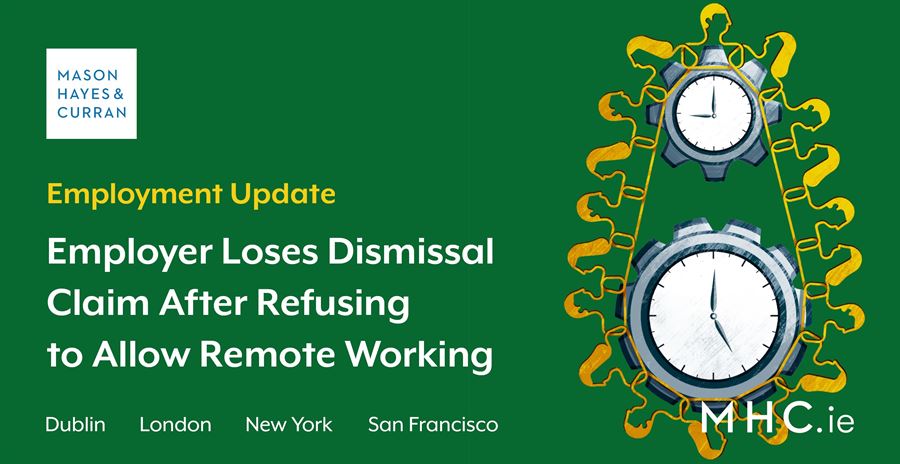Employer Loses Dismissal Claim after Refusing to Allow Remote Working
Background
The employee worked for a facilities management company and worked on-site at a university client's premises. Her role involved checking students in and out of the university, and managing maintenance issues.
In January / February 2020, the employee, together with two colleagues, raised health and safety concerns associated with the workplace and the COVID-19 pandemic, which were largely ignored by the employer.
The employee raised a formal grievance in April 2020, mainly with regard to COVID-19 concerns, as she had family members in the ‘at risk’ category and was concerned about the health of her family members, as well as her own wellbeing. She sought to work remotely, arguing that most of her work could be completed from home, and that she and her colleagues could operate a rota to attend the office.
The employee went on work-related stress leave for four weeks and returned to work in May 2020. After she returned, her employer met with her and her colleagues, to brief them on the measures that had been taken to mitigate the risk of COVID-19 infection in the workplace. However, the employer maintained that the employee’s role was not suitable for remote working and because the employee was an essential worker, she was required to attend the office. The employee subsequently resigned from her employment with immediate effect.
Workplace Relations Commission
In response to the constructive dismissal claim, the employer argued that the employee’s job required her to be on site and that the university would not have allowed her to work remotely. Further, the employer argued that measures had been put in place in response to the pandemic including the installation of a barrier, the supply of cleaning materials and personal protective equipment. The layout of the office had been changed and the employee’s desk had been moved. The employer stated that no member of staff had contracted COVID-19 on the client’s site and the employee was an essential worker as the provision of student accommodation was an essential service.
The Workplace Relations Commission found that the employee’s grievance was not adequately considered and that the proposal of a rota system for the three colleagues was "eminently sensible" given the health and safety risks and the potential to reduce COVID-19 transmission. In the absence of any objection from the university, the employer did not provide an adequate explanation as to why it refused to agree to the proposal.
The Workplace Relations Commission held that the employer’s requirement for the employee to attend the workplace, without adequate consideration as to how to eliminate the risk, amounted to a repudiation of the employee’s contract. Providing a safe place of work was a fundamental term of the employment contract. The Workplace Relations Commission highlighted that the most effective way to address a health and safety risk is to eliminate it and commented that personal protective equipment is the last resort and the least effective measure. They noted that this risk could have been readily eliminated or reduced through "reasonably practicable" steps, as the employee had suggested. Therefore, the employee had no real option but to resign.
The Workplace Relations Commission determined that the employee had been constructively dismissed and awarded her €3,712.50 in compensation. The employee had secured a new job at a higher salary within five weeks of resigning, so her financial loss was limited.
Conclusion
This decision serves as a salient reminder to employers to engage constructively with employees who seek accommodations in relation to what is, after all, an exceptional situation. Any decision to permit, or reject, requests must be adequately considered, and any decision should not be taken without reviewing the risk assessments and safety statements to determine how best to manage and address health and safety issues.
Employers must also comply with the Return to Work Safely Protocol published by the Government, which is designed to support employers and to put measures in place to prevent the spread of COVID-19 in the workplace.
For more information, contact a member of our Employment & Benefits team.
The content of this article is provided for information purposes only and does not constitute legal or other advice.
Share this:





